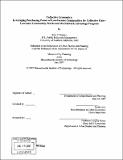| dc.contributor.advisor | Frank Levy. | en_US |
| dc.contributor.author | Espino, Eric V | en_US |
| dc.contributor.other | Massachusetts Institute of Technology. Dept. of Urban Studies and Planning. | en_US |
| dc.coverage.spatial | n-us-ma | en_US |
| dc.date.accessioned | 2008-02-04T20:48:17Z | |
| dc.date.available | 2008-02-04T20:48:17Z | |
| dc.date.copyright | 2007 | en_US |
| dc.date.issued | 2007 | en_US |
| dc.identifier.uri | http://hdl.handle.net/1721.1/40119 | |
| dc.description | Thesis (M.C.P.)--Massachusetts Institute of Technology, Dept. of Urban Studies and Planning, 2007. | en_US |
| dc.description | Includes bibliographical references (p. 88). | en_US |
| dc.description.abstract | This thesis focuses on the concept of Collective Economics and develops a set of recommendations by which groups with common interests can effectively utilize their purchasing power for collective benefits. Working with Lawrence Community Works (LCW), the thesis provides an economic profile of the organization's membership as the basis for proposing partnerships that seek to leverage the purchasing power of members for collective benefits. Based in Lawrence, MA, LCW is a community development corporation dedicated to investing in both people and place as well as increasing ownership in the community by the community. As an immigrant city and one of the poorest in the Commonwealth, there are few opportunities for residents to break out of an economic cycle all too common among a large portion of the citizenry. In an effort to counter this cycle and provide hope for members, LCW is looking to use their established Network as the vehicle to promote a demand-oriented environment where group size and economic characteristics can be leveraged for group discounts and benefits. | en_US |
| dc.description.abstract | (cont.) Through the use of survey data and a discussion of lessons learned from a handful of interviews, I propose partnership ideas centered on marker-oriented approaches to using LCW's size, members' consumer preferences, and purchasing power to secure member benefits or channel money into a community fund. Focusing on the effective directing of members' preferences and financial habits for collective gain, proposed partnerships highlight the amount of money that can be saved by members as well as gained by partners in the form of additional revenue. | en_US |
| dc.description.statementofresponsibility | by Eric V. Espino. | en_US |
| dc.format.extent | 88 p. | en_US |
| dc.language.iso | eng | en_US |
| dc.publisher | Massachusetts Institute of Technology | en_US |
| dc.rights | M.I.T. theses are protected by copyright. They may be viewed from this source for any purpose, but reproduction or distribution in any format is prohibited without written permission. See provided URL for inquiries about permission. | en_US |
| dc.rights.uri | http://dspace.mit.edu/handle/1721.1/7582 | |
| dc.subject | Urban Studies and Planning. | en_US |
| dc.title | Collective economics : leveraging purchasing power of low-income communities for collective gain : Lawrence Community Works and the Network Advantage Program | en_US |
| dc.title.alternative | Leveraging purchasing power of low-income communities for collective gain : Lawrence Community Works and the Network Advantage Program | en_US |
| dc.type | Thesis | en_US |
| dc.description.degree | M.C.P. | en_US |
| dc.contributor.department | Massachusetts Institute of Technology. Department of Urban Studies and Planning | |
| dc.identifier.oclc | 187138025 | en_US |
